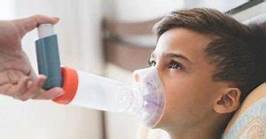Asthma
Asthma in Children
Asthma is a condition in which your airways narrow and swell and may produce extra mucus. This can make breathing difficult and trigger coughing, a whistling sound (wheezing) when you breathe out and shortness of breath.For some people, asthma is a minor nuisance. For others, it can be a major problem that interferes with daily activities and may lead to a life-threatening asthma attack.Asthma can’t be cured, but its symptoms can be controlled. Because asthma often changes over time, it’s important that you work with your doctor (DIVI SPECIALITY CLINICS :)to track your signs and symptoms and adjust your treatment as needed.
Symptoms
Asthma symptoms vary from person to person. You may have infrequent asthma attacks, have symptoms only at certain times — such as when exercising — or have symptoms all the time.
Asthma signs and symptoms include:
Shortness of breath
Chest tightness or pain
Wheezing when exhaling, which is a common sign of asthma in children
Trouble sleeping caused by shortness of breath, coughing or wheezing
Coughing or wheezing attacks that are worsened by a respiratory virus, such as a cold or the flu
Signs that your asthma is probably worsening include:
Asthma signs and symptoms that are more frequent and bothersome
Increasing difficulty breathing, as measured with a device used to check how well your lungs are working (peak flow meter)
The need to use a quick-relief inhaler more often
For some people, asthma signs and symptoms flare up in certain situations:
Exercise-induced asthma, which may be worse when the air is cold and dry
Occupational asthma, triggered by workplace irritants such as chemical fumes, gases or dust
Allergy-induced asthma, triggered by airborne substances, such as pollen, mold spores, cockroach waste, or particles of skin and dried saliva shed by pets (pet dander)
When to see a doctor :
Seek emergency treatment
Severe asthma attacks can be life-threatening. Work with your doctor to determine what to do when your signs and symptoms worsen — and when you need emergency treatment. Signs of an asthma emergency include:
Rapid worsening of shortness of breath or wheezing
No improvement even after using a quick-relief inhaler
Shortness of breath when you are doing minimal physical activity
Contact your doctor
If you think you have asthma. If you have frequent coughing or wheezing that lasts more than a few days or any other signs or symptoms of asthma, see your doctor. Treating asthma early may prevent long-term lung damage and help keep the condition from getting worse over time.
To monitor your asthma after diagnosis. If you know you have asthma, work with your doctor to keep it under control. Good long-term control helps you feel better from day to day and can prevent a life-threatening asthma attack.
If your asthma symptoms get worse. Contact your doctor right away if your medication doesn’t seem to ease your symptoms or if you need to use your quick-relief inhaler more often.
Don’t take more medication than prescribed without consulting your doctor first. Overusing asthma medication can cause side effects and may make your asthma worse.
To review your treatment. Asthma often changes over time. Meet with your doctor regularly to discuss your symptoms and make any needed treatment adjustments.

Shortness of breath :

Diagnosing a child with asthma can be difficult, as they may show no symptoms for a long period before they experience an asthma attack. It may also be difficult to distinguish asthma from other respiratory illnesses, and some children may have difficulty explaining their symptoms.
A doctor will ask about family history and perform a physical and medical exam.
If another family member has asthma or allergies, this increases the chance that the child may have asthma.
If the child is old enough, the exams typically will involve a test that will measure airflow in and out of the lungs. A doctor may also use skin or blood tests to see if the child has allergies that can trigger asthma symptoms.
People can controlTrusted Source their asthma and avoidTrusted Source potential asthma attacks by taking their medication and avoiding possible triggers. Typically, a doctor will prescribe two types of asthma medication — one for quick relief and one for long-term control.
Quick relief, or rescue, medications quickly relax and open the airways to help relieve symptoms during an asthma flare-up. A doctor may also suggest a person use them before exercise. Doctors call these medications short-acting beta-agonists. They include albuterol and levalbuterol.
Controller medications can help a person have fewer and milder asthma attacks over time but will not help if a person is having an asthma attack. These include:
- corticosteroids
- combination inhalers, containing corticosteroids and long-acting beta-agonists
- anticholinergics
- leukotriene inhibitors
It is important for those with more persistent symptoms to take both types of medication and not rely just on quick relief medications.
In some cases, a doctor may suggest biologics to treat severe or difficult-to-treat asthma. A doctor can administer biologics via injections or infusions. The doctor may do a blood test to determine if biologics are suitable to treat the type of asthma a person has.
There are also some home remedies that may help ease symptoms of asthma. Learn more about them here.
